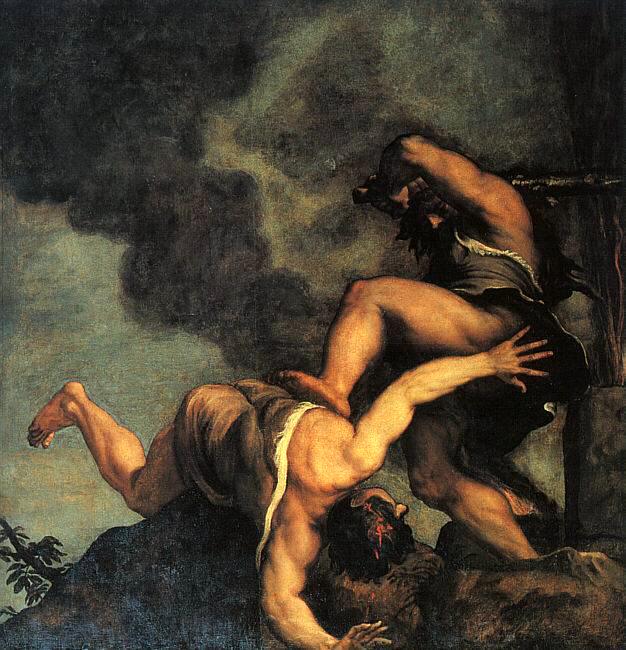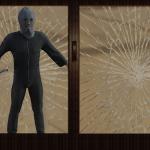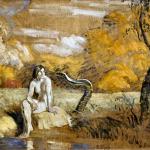
This is a follow-up to my post, “Where Did Cain Get His Wife?” I responded to comments underneath that paper. Words of “kingmcdee” will be in blue. Those of “alwayspuzzled” (I hope s/he isn’t after my reply!) will be in green, and words of fritzpatrick in purple. Words of Matt Kososki will be in brown.
*****
I know you approvingly cited Feser, Flynn, et al in defense of a literal Adam and Eve a few years ago, so I suppose that you’re at least open to the scenario they pose there (an original first pair of true, “philosophical humans”, alongside a number of genetically-similar but non-ensouled and non-rational hominids). If this scenario happens to be true, then wouldn’t that also provide an answer to this question, since there’d be no wonder at where Cain got his wife?
Well, I don’t think it makes sense to mate with non-ensouled hominids (the moral equivalent of bestiality). I think the assumption is that it would be other human beings made in the image of God. I don’t think the “problem” is that difficult to solve, as long as it is understood that in earlier times, there was marriage with much closer relatives, and also considering the passage of time that isn’t precluded by the texts.
Probably, at the time that Cain got his wife, that may not have been needed. So even if the scenario I presented were true, that part (about Cain’s wife) needn’t be. However, I should point out that in the situation presented, we needn’t approve of the actions, merely note that they may have happened, even if this were contrary to natural and moral law. After all, Adam and Eve ate of the Fruit of the Tree of Knowledge even though this were contrary to the moral and natural law, and the same is true of Cain’s murder of Abel.
In any case, I don’t wish to fight this case — I’m just noting the possibility. I’m totally open to being wrong. I ultimately defer to the teaching of Mother Church on the subject.
Such matings could have happened, I suppose. But then, it may be that infertility would result. :-)
***
Science tells us that the Modern Human gene pool includes Neanderthal and Denisovan DNA, so it is quite obvious where Cain got his wife (or wives, or …)
Science doesn’t tell us that God gave these hominids a soul (assuming an evolutionary past): at which time they were “made in God’s image.”
It can’t deal with that by definition because it denies (either absolutely or “methodologically”) that there are things such as souls and immaterial entities. The subject of science is matter.
You seem to be saying that both partners in the reproductive process need to possess souls. Is that because the soul is genetically transmitted from the parents to the child through the union of the parents’ DNA in the offspring’s DNA?
I think one would know the difference, just as we do today between a human being and a dog. Christians believe that the former has a soul and the latter does not. Thus, society (including most atheists, I would imagine) has held that sex with a dog is immoral (bestiality).
Catholics (in agreement with the Bible) believe that God supernaturally creates a soul at the instant of every persons’s conception, so it’s not transmitted through DNA. How could it be? It’s not matter. See the excellent article, “When Babies Get Their Souls,” by apologist Jimmy Akin.
“Catholics (in agreement with the Bible) believe that God supernaturally creates a soul at the instant of every person’s conception”
Exactly!! So why would it make a difference if one (or both) of the parents did not have a soul?
It depends on what you mean by “make a difference.” We can’t mate with any of the animals now. It may have been the same state of affairs then. It’s not difficult to reasonably draw that conclusion (as I have). Whether reproduction was possible would be a biological thing. It very well may not have been, based on being different species in some sense.
***
I appreciate your efforts to make sense of the Bible, but I think in this case they are misguided and not aligned with the majority of Catholic scholarship today. Here’s a quote from my Catholic Study Bible (1995 Oxford Univ. Press, p. RG21):
Clearly, many of the stories in the Pentateuch are not at all about ordinary time in history. Genesis 1-11, for example, does not fit the category of history telling because it treats the creation of the world and the first events of human existence without any historical concreteness. By trying to answer universal questions — questions like Why did God make humans this way? Why do we sin? Why do we die? why is it hard to obey God? Why are men and women different? — the stories of Genesis 1-11 fall into the literary genre of myth.
No Catholic scholars say that the Bible’s authors were ignorant. On the contrary, they were insightful interpreters and commentators and, in the case of Genesis 1-11, creative geniuses. The long and the short of it is: Adam and Eve didn’t eat from the Tree of Knowledge of Good and Evil, Cain didn’t murder Abel, Noah didn’t build an ark, and people didn’t start different languages because of an incident with a Tower of Babel — not if were talking history. But these stories all tell us a lot about ourselves, our relation to each other and a world, and our relation to God. History, along with legend and other literary genres, starts coming into the Bible with the stories of the Patriarchs. — Jack (Fritz Patrick) Hartjes
I agree that there are some symbolic things in early Genesis. I just posted yesterday, in my paper about the serpent:
Christians aren’t required to believe in “talking snakes” anymore than they must believe in a literal tree and fruit in the same passage. They are required to believe in the temptation and original sin / fall of man (i.e., rebellion against God) that the story poetically describes.
Here, however, you (and liberal exegetes, who are innumerable) go too far, by denying historical elements that are present in Genesis alongside the poetic, metaphorical aspects. This involves insuperable difficulties with the [inspired] New Testament, which presupposes the historicity of Cain and Noah. Jesus Himself referred to Abel being murdered by Cain, comparing it to other indisputably historical murders (Matthew 23:34-35; cf. Lk 11:49-51). 1 John 3:12 refers to the same thing, as does Hebrews 11:4 and 12:24.
Likewise, Noah is mentioned in the same context as other historical persons (people no one denies were historical figures), and the ark is referred to (historically) in 1 Peter 3:18-21; 2 Peter 2:4-9. See my paper: Adam and Eve, Cain, Abel, and Noah: Historical Figures.
In that paper, I noted that the Catechism refers to Cain and Abel as actual human beings twice, and to Noah and the Flood nine times. That’s the magisterium, which is superior to mere Catholic scholarship. We’re not a Church whose doctrine is determined by a head count of scholars, but rather, by bishops, popes, and ecumenical councils.
***
The reason human beings cannot mate with any animals now is because they are too genetically different. Hundreds of thousands of years ago, that was not necessarily the case. Back then, what we would now call modern humans shared the planet with Neanderthals, Denisovans, and possibly other unknown human species. These species (or possibly subspecies) were genetically similar enough to each other to produce viable offspring, which we can see in the DNA of their modern descendants. If you had non-African ancestors, Dave, you might have a Neanderthal somewhere in your lineage.
But all that would be way before Adam and Eve and God putting a soul into the hominids to make them the first human beings, made in His image. It’s all perfectly possible within an orthodox, monogenist framework. The discussion above (that I was replying to) was about Cain finding a wife, per the OP, which was, of course, post-Adam, and post-human beings with souls. So I was saying that by then inter-breeding may have no longer been possible. I have no idea. I’m just speculating and thinking out loud.
***
Photo credit: Cain and Abel, by Titian (1490-1576) [public domain / Wikimedia Commons]
***

















